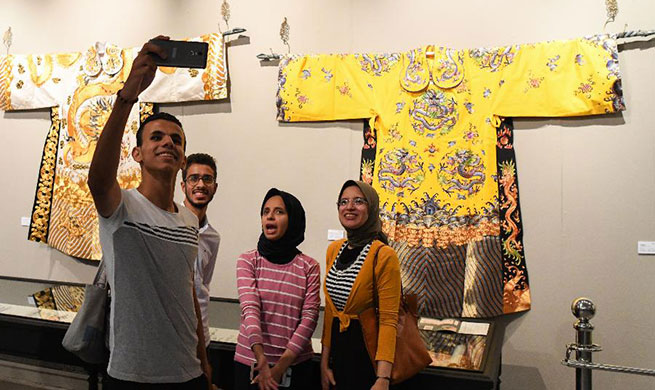TRIPOLI, Aug. 11 (Xinhua) -- Many Libyans are suffering from poor public medical services, particularly patients of heart diseases, cancer and diabetes, with lack of government-subsidized medicines and frequent power blackouts that last for as long as 14 hours daily.
Ibtisam Al-Sharif, 58-year-old divorced house wife and mother of three, is suffering from diabetes and heart problems. She is struggling to get necessary medicines that keep her alive.
She cannot afford expensive medicines or treatments from private clinics or pharmacies. So, she moves from one government hospital to another searching for insulin and heart medicines.
"I have reached the point of suicide because of a lack of treatment in government hospitals and health centers. Throughout the week, I move from one hospital to another in search of my medicine. A week ago, I traveled 200 km to the city of Misurata, after a friend helped me get insulin enough for one month only," Al-Sharif told Xinhua.
"I do not have enough money for treatment, and I can barely feed myself and my children, especially since we have no supporter to pay for the daily expenses," she said. "I feel that I am slowly dying. I feel pain surrounding my body every day."
34-year-old Abdurraheem told a similar story. "I have kidney failure and I do dialysis twice a week. I also have diabetes. My mental state is devastated by the lack of medication and continuous dialysis."
"I have traveled with my younger brother from one city to another in the west of the country. I was looking for a hospital to receive me but failed, either because of the lack of operating materials or the long-time power blackouts, or the hospital's inability to operate the equipment," Abdurraheem told Xinhua.
He revealed that he lost part of his left foot, as a result of amputation due to the lack of diabetes medicine.
"They had amputated part of my left foot, after I had a severe infection to the point where I did not feel it because of the constant absence of medication and the power blackouts. My foot cannot bear to stay in a room without air conditioning. Frankly, I told my family I wished death rather than to continue to live this way," he added.
The deficit of electricity in Libya is more than 2,000 megawatts per day, while the current electricity production is no more than 5,500 megawatts per day, according to the state-owned General Electricity Company.
Most foreign companies left Libya because of the security deterioration following the overthrow of former leader Gaddafi's regime in 2011, and most development projects in the fields of electricity, water and housing were suspended.
Government hospitals and clinics in Libya are facing serious difficulties in operation and providing medicines, which put them under great pressure as a result of inability to absorb large numbers of patients.
Khairy al-Agha, a diabetes specialist, said that government hospitals are facing unprecedented difficulties since the independence last century, which threaten the national security and create high risk of death for many Libyans.
"People with chronic diseases, especially diabetes, have problems because they cannot afford treatment of private clinics, in the absence of adequate doses of medication in government hospitals, and lack of medical examinations to follow up their condition," Agha told Xinhua.
He pointed out that chronic diseases medicines are "very expensive and ordinary people cannot afford them, which are government-subsidized in most countries around the world."
"With the chaos and lack of control of the border, fraud drugs spread in the market. Many patients buy them, although many of them know their danger to their health. But there is no other way with the severe shortage of medicines. Many of the fraud drugs are not of good quality or even expired. Thus, patients become infected with new diseases that increase their daily suffering," Agha added.
He also said that power blackouts damaged dialysis equipment and some medicines that need a certain temperature to store, "which should be addressed quickly so that the remainder of the health system of the country does not collapse altogether."













